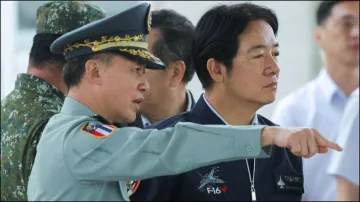Taiwan urges citizens to avoid travel to China, Hong Kong over threats of execution for 'separatists'
The development came after China threatened to impose the death penalty on pro-Taiwan independence 'separatists' for secessionist activities. Tensions between China and Taiwan have flared after President Lai Ching-te came to power, with rising military pressure by Beijing.

Taipei: The Taiwanese government has raised its travel warning for citizens intending to visit China and Hong Kong, telling them not to go unless absolutely necessary, following a purported threat by Beijing last week to execute those it deemed "diehard" Taiwan independence supporters. The threat by China, which considers Taiwan as its own territory, further escalated the already heated tensions between the country and Taiwanese President Lai Ching-te, who advocates independence.
China on Friday (June 21) threatened to impose the death penalty in extreme cases for "diehard" Taiwan independence separatists for splitting the country and inciting secession offences in accordance with the law and to defend the national sovereignty of China. The provocative remarks drew condemnation from Lai and his government, as well as the US.
Liang Wen-chieh, spokesperson for Taiwan's Mainland Affairs Council, told reporters the raised travel warning also applied to the Chinese-run cities of Hong Kong and Macau. He said the guidelines represented a serious threat to the safety of the Taiwanese people visiting China, in addition to other measures China has taken to strengthen its national security laws.
"If it is not necessary to go, then don't," he said, adding this did not amount to a ban on visiting and was about protecting Taiwan's people and reminding them of the risk rather than being a "countermeasure". China's Taiwan Affairs Office did not immediately respond to a request for comment. It said on Wednesday that the guidelines were only aimed at a very small number of independence "diehards' evil words and actions".
China's rhetoric against pro-Taiwan independence 'separatists'
China has vowed to go after people it views as Taiwan 'separatists', though Chinese courts have no jurisdiction in Taiwan and it is not clear how China could seek to enforce any judgments outside its borders. Beijing's dislike of Lai Ching-te has been quite visible since he took office, as it calls him a "separatist" and has staged war games after his inauguration.
Taiwan has complained of heightened Chinese pressure since Lai won the election in January, including military actions, trade sanctions and coast guard patrols around Taiwan-controlled islands next to China. The latest guidelines, reportedly being issued in accordance with China's 2015 anti-succession law, give it the legal basis for military action against Taiwan if it secedes or seems about to.
Sun Ping, an official from China's Ministry of Public Security, told reporters in Beijing the maximum penalty for the "crime of secession" was the death penalty. "The sharp sword of legal action will always hang high," she said. Taiwan's Mainland Affairs Council on Friday slammed Beijing's move, urging its people not to be threatened by China.
"The Beijing authorities have absolutely no jurisdiction over Taiwan, and the Chinese communists' so-called laws and norms have no binding force on our people. The government appeals to our country's people to feel at ease and not to be threatened or intimidated by the Chinese Communist Party," it said in a statement.
Taiwan's offer for talks rebuffed by China
Notably, Lai has repeatedly offered to hold talks with China but has been rebuffed. He says only Taiwan's people can decide their future. Moreover, China has taken legal measures against Taiwanese officials before, including imposing sanctions on Hsiao Bi-khim, Taiwan's former de facto ambassador to the United States and now the island's vice president.
China claims Taiwan, as part of the mainland and Beijing’s assertions under current Chinese President Xi Jinping’s rule to reclaim the estranged island have gotten louder in recent years sparking concerns about military actions by the People’s Liberation Army (PLA). In the last few years, there was heavy military build-up by the PLA in the Taiwan Straits followed by offensive actions by the Chinese navy, air force and missile forces.
In April, Chinese President Xi Jinping told his US counterpart, Joe Biden, over a phone call that the Taiwan issue is the "first red line" that must not be crossed by Washington and warned that Beijing will "not sit on its hands" if "Taiwan independence" forces step up their "separatist activities" with the help of external elements. He urged the US to act in accordance “with President Biden’s commitment of not supporting ‘Taiwan independence.
(with inputs from agencies)
ALSO READ | China's biggest action on US, imposes sanctions on Lockheed Martin over Taiwan arms sales